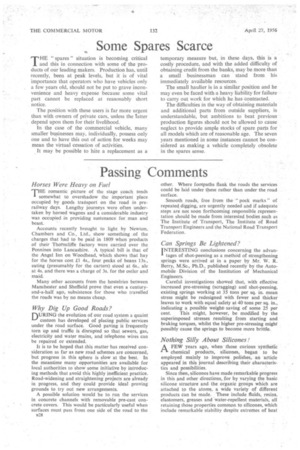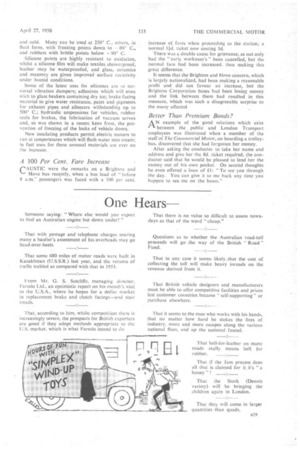Passing Comments
Page 38

Page 39

If you've noticed an error in this article please click here to report it so we can fix it.
Horses Were Heavy on Fuel
THE romantic picture of the stage coach tends A somewhat to overshadow the important place occupied by goods transport on the road in prerailway days. Lengthy journeys were often undertaken by horsed wagons and a considerable industry was occupied in providing sustenance for man and beast.
Accounts recently brought to light by Newton. Chambers and Co., Ltd., show something of the charges that had to be paid in 1809 when products of their Thorncliffe factory were carried over the Pennines into Lancashire. A typical bill is that of the Angel Inn on Woodhead, which shows that hay for the horses cost Li 4s., four pecks of beans 13s., eating (presumably for the carters) stood at 6s., ale at 4s. and there was a charge of 3s. for the ostler and maid.
Many other accounts from the hostelries between Manchester and Sheffield prove that even a centuryand-a-half ago, subsistence for those who travelled the roads was by no means cheap.
Why Dig Up Good Roads?
DURING the evolution of our road system a quaint
custom has developed of placing public services under the road surface. Good paving is frequently torn up and traffic is disrupted so that sewers, gas, electricity and water mains, and telephone wires can be repaired or extended.
It is to be hoped that this matter has received consideration as far as new road schemes are concerned, but progress in this sphere is slow at the best. In the meantime many opportunities are available for local authorities to show some initiative by introducing methods that avoid this highly inefficient practice. Road-widening and straightening projects are already in progress, and they could provide ideal proving grounds to try out new arrangements.
A possible solution would be to run the services in concrete channels with removable pre-cast concrete covers. This would be particularly useful when surfaces must pass from one side of the road to the B28 other. Where footpaths flank the roads the services could be laid under these rather than under the road surface.
Smooth roads, free from the "pock marks" of repeated digging, are urgently needed and if adequate steps are not soon forthcoming responsible representation should be made from interested bodies such as The Institute of Transport, The Institute of Road Transport Engineers and the National Road Transport Federation.
Can Springs Be Lightened?
I NTERESTING conclusions concerning the advan tages of shot-peening as a method of strengthening springs were arrived at in a paper by Mr. W. R. Berry, M.Sc., Ph.D., published recently by the Automobile Division of the Institution of Mechanical Engineers.
Careful investigations showed that, with effective increased pre-stressing (scragging) and shot-peening, existing springs working at 35 tons per sq. in. mean stress might be redesigned with fewer and thicker leaves to work with equal safety at 40 tons per sq. in., indicating a possible weight saving of some 2.5 per
cent. This might, however, be modified by the superimposed stresses resulting from starting and braking torques, whilst the higher pre-stressing might possibly cause the springs to become more brittle.
Nothing Silly About Silicones!
AFEW years ago, when those curious synthetic chemical products, silicones, began to be employed mainly to improve polishes,, an article appeared in this journal describing their characteristics and possibilities.
Since then, silicones have made remarkable progress in this and other directions, for by varying the basic silicone structure and the organic groups which are attached to the atoms, a wide variety of different products can be made. These include fluids, resins, elastomers, greases and water-repellent materials, all retaining those properties common to silicones, which include remarkable stability despite extremes of heat and cold. Many can be used at 250° C.; others, in fluid form, with freezing points down to —80° C., and rubbers with brittle points below —90° C.
Silicone paints are highly resistant to oxidation, whilst a silicone film will make textiles showerproof, leather may be waterproofed, and glass, ceramics and masonry are given improved surface resistivity under humid conditions.
Some of the latest uses for silicones are in torsioaal vibration dampers; adhesives which will even stick to glass beakers containing dry ice; brake-facing material to give water resistance, paint and pigments for exhaust pipes and silencers withstanding up to 500° C.; hydraulic suspensions for vehicles, rubber seals for brakes, the lubrication of vacuum servos and, a's was shown in a recent keen frost, the prevention of freezing of the locks of vehicle doors.
New insulating products permit electric motors to run at temperatures which will flash water into steam; in fact uses for these unusual materials arc ever on the increase.
A 100 Per cent. Fare Increase
CAUSTIC were the remarks on a Brighton and Hove bus recently, when a bus load of before 8 a.m." passengers was faced with a 100 per cent.
increase of fares when proceeding to the station; a normal lid. ticket now costing 3d.
There was a double cause for grievance, as not only had the "early workman's" been cancelled, but the normal fare had been increased, thus making this great difference. • It seems that the Brighton and Hove concern, which is largely nationalized, had been making a reasonable profit and did not favour an increase, but the Brighton Corporation buses had been losing money and the link between them had resulted in this measure, which was stich a disagreeable surprise to the many affected.
Better Than Premium Bands?
AN example of the good relations which exist
between the public and London Transport employees was illustrated when a member of the staffof The Commercial Motor, on boarding a trolleybus, discovered that she had forgotten her money.
After asking the conductor to take her name and address and give her the 8d. ticket required, the conductor said that he would be pleased to lend her the money out of his Own pocket. On second thoughts he even offered a loan of £1: "To see you through the day. You can give it to me hack any time you happen to see. me on the buses."




































































































































